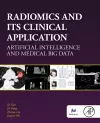
Radiomics and Its Clinical Application
4 authors - Paperback
£97.99
Dr. Jie Tian received his PhD (with honors) in Artificial Intelligence from the Chinese Academy of Sciences in 1993. Since 1997, he has been a Professor at the Chinese Academy of Sciences. Dr. Tian has been elected as a Fellow of ISMRM, AIMBE, IAMBE, IEEE, OSA, SPIE, and IAPR. He serves as an editorial board member of Molecular Imaging and Biology, European Radiology, IEEE Transactions on Medical Imaging, IEEE Transactions on Biomedical Engineering, IEEE Journal of Biomedical and Health Informatics, and Photoacoustics. He is the author of over 400 peer-reviewed journal articles, including publication in Nature Biomedical Engineering, Science Advances, Journal of Clinical Oncology, Nature Communications, Radiology, IEEE Transactions on Medical Imaging, and many other journals, and these articles have received over 25,000 Google Scholar citations (H-index 79). Dr. Tian is recognized as a pioneer and leader in the field of molecular imaging in China. In the last two decades, he has developed a series of new optical imaging models and reconstruction algorithms for in vivo optical tomographic imaging, including bioluminescence tomography, fluorescence molecular tomography, and Cerenkov luminescence tomography. He has developed new artificial intelligence strategies for medical imaging big data analysis in the field of radiomics and played a major role in establishing a standardized radiomics database with more than 100,000 cancer patients data collected from over 50 hospitals all over China. He has received numerous awards, including 5 national top awards for his outstanding work in medical imaging and biometrics recognition. Dr. Di Dong is currently an Associate Professor at the Institute of Automation, Chinese Academy of Sciences. He received his PhD in Pattern Recognition and Intelligent Systems from the Institute of Automation, Chinese Academy of Sciences, China, in 2013. Dr. Dong is a member of the Youth Innovation Promotion Association of the Chinese Academy of Sciences, an active member of the American Association for Cancer Research (AACR), and a corresponding member of the European Society of Radiology (ESR). Dr. Dong has carried out long-term research work in the field of tumor radiomics and medical big data analysis. In recent years, Dr. Dong has published nearly 50 peer-reviewed papers in SCI journals, e.g., in Annals of Oncology, European Respiratory Journal, Clinical Cancer Research (3 publications), BMC Medicine, etc. These articles received over 1,600 Google Scholar citations (H-index 24). He has 6 ESI highly cited papers. He has applied for more than 20 patents and 10 software copyright licences in China. Dr. Zhenyu Liu is currently a Professor at CAS Key Laboratory of Molecular Imaging, Institute of Automation. He received his PhD in Pattern Recognition and Intelligent Systems from the Institute of Automation, Chinese Academy of Sciences, China, in 2014. Dr. Liu got the outstanding youth fund of the Natural Science Foundation of China (NSFC) and is a member of the Youth Innovation Promotion Association of the Chinese Academy of Sciences. His research focuses on medical imaging analysis, especially radiomics and its application in oncology research. In recent years, Dr. Liu has published nearly 30 papers in peer-reviewed journals, e.g., in Clinical Cancer Research, Theranostics, EBioMedicine, Radiotherapy and Oncology, etc. These articles received over 1,300 Google Scholar citations. He also holds more than 10 patents in China. Dr. Jingwei Wei is currently an Assistant Professor at the Institute of Automation, Chinese Academy of Sciences. Her research focuses on radiomics and its clinical application on liver diseases, liver-specific feature engineering, traditional pattern recognition classifiers, and deep learning methods implemented towards liver disease-oriented research. Her primary main work includes pre-operative prediction of microvascular invasion in hepatocellular carcinoma (HCC), prognosis prediction in HCC, and non-invasive imaging biomarker development for pathological factors prediction in liver diseases. Dr. Wei has published over 20 peer-reviewed papers in SCI journals, e.g., in Liver Cancer, Liver International, Clinical and Translational Gastroenterology, etc.